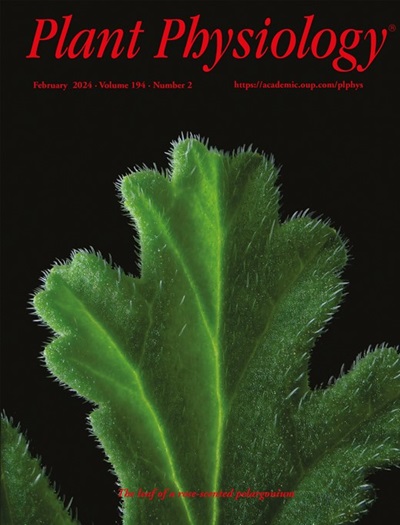三磷酸硫胺素抑制了叶绿体ATP合酶的激活状态。
IF 6.9
1区 生物学
Q1 PLANT SCIENCES
引用次数: 0
摘要
代谢效应器在协调生物过程中是至关重要的。B族维生素衍生的辅酶对于协调代谢酶活动至关重要,其破坏与人类的许多疾病和植物的健康有关。这些辅酶的修饰衍生物存在,并可能作为效应器调节某些代谢过程,但仍未被探索。在这里,我们证明了非辅酶维生素B1衍生物三磷酸硫胺素在拟南芥(拟南芥)光照期早期短暂产生。这种化合物的产生是由叶绿体中的化学渗透机制驱动的,这与哺乳动物的神经细胞形成鲜明对比,在哺乳动物的神经细胞中,它是在线粒体中产生的。利用光合作用的生物物理技术,我们发现三磷酸硫胺素可以抑制叶绿体ATP合酶的激活状态。这一效应可能是由于叶绿体中无机磷酸盐和辅酶二磷酸硫胺素合成了三磷酸硫胺素,从而改变了光合作用的底物收支,影响了Calvin-Benson循环中ATP合成和消耗的协调。有趣的是,三磷酸硫胺素的缺失改变了质体编码ATP合成酶亚基的表达。这项研究扩大了我们对辅酶衍生物作为生物系统中的调节分子的认识,在这种情况下,它们对能量代谢的调节。本文章由计算机程序翻译,如有差异,请以英文原文为准。
Thiamine triphosphate puts the brake on the activation state of chloroplast ATP synthase.
Metabolic effectors are critical in orchestrating biological processes. B vitamin-derived coenzymes are vital for coordinating metabolic enzyme activities, the disruption of which has been linked to numerous diseases in humans and fitness in plants. Modified derivatives of these coenzymes exist and could act as effectors to regulate certain metabolic processes but remain unexplored. Here, we demonstrate that the non-coenzyme vitamin B1 derivative thiamine triphosphate is transiently produced early during the light period in Arabidopsis thaliana (Arabidopsis). The production of this compound is driven by a chemiosmotic mechanism in the chloroplast, which contrasts with mammalian neuronal cells, where it is produced in the mitochondria. Using biophysical techniques of photosynthesis, we show that thiamine triphosphate serves to brake the activation state of chloroplast ATP synthase. This effect is suggested to be achieved by the opportune biosynthesis of thiamine triphosphate from inorganic phosphate and the coenzyme thiamine diphosphate in chloroplasts, which alters the substrate budget of photosynthesis, affecting the coordination of ATP synthesis and consumption during the Calvin-Benson cycle. Intriguingly, the absence of thiamine triphosphate alters the expression of plastid-encoded ATP synthase subunits. The study expands our knowledge on coenzyme derivatives as regulatory molecules in biological systems and, in this case, their regulation of energy metabolism.
求助全文
通过发布文献求助,成功后即可免费获取论文全文。
去求助
来源期刊

Plant Physiology
生物-植物科学
CiteScore
12.20
自引率
5.40%
发文量
535
审稿时长
2.3 months
期刊介绍:
Plant Physiology® is a distinguished and highly respected journal with a rich history dating back to its establishment in 1926. It stands as a leading international publication in the field of plant biology, covering a comprehensive range of topics from the molecular and structural aspects of plant life to systems biology and ecophysiology. Recognized as the most highly cited journal in plant sciences, Plant Physiology® is a testament to its commitment to excellence and the dissemination of groundbreaking research.
As the official publication of the American Society of Plant Biologists, Plant Physiology® upholds rigorous peer-review standards, ensuring that the scientific community receives the highest quality research. The journal releases 12 issues annually, providing a steady stream of new findings and insights to its readership.
 求助内容:
求助内容: 应助结果提醒方式:
应助结果提醒方式:


